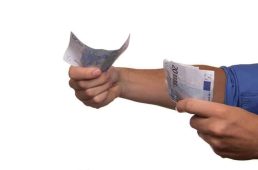Greta Thunberry of Sweden was only eight years old when she first heard about global warming. Unable to understand why no one was doing anything about it, she fell into a severe depression, and at the age of fourteen began demonstrating every Friday in front of the Stockholm parliament building. It has attracted hundreds of thousands of young people around the world who have demanded that governments take meaningful action on the climate crisis.
So yes, not all of us have been cut from the hard material that Greta is made of, but it is important that we understand – the climate crisis is not “fake news”, it is not hobby designed to occupy rich people in their leisure time. The crisis is real and is backed up by thousands of studies showing the direct link between global warming and extreme weather events (droughts, floods, heat waves and hurricanes) and the enormous damage they cause.
We at Paamonim have long known that it is difficult to teach an old dog new tricks, but the people who come to us understand that changing habits is necessary. Here are four ways to make your life greener without spending more money and maybe even saving:
Plastic bags in the supermarket
In 2002, Ireland passed a law requiring a tax of 33 cents (about a shekel and a half) on every disposable bag. Guess what happened? There are no more plastic bags in Ireland. What about Scandinavia? Same. If you go to a supermarket in Denmark, you’ll find plastic bags and paper (recycled) for about 4 kronor (between 1.5 and 2 shekels). The idea is obvious, isn’t it?
How many of you would continue to pay for plastic bags at the supermarket if each bag cost us between one and two shekels? How many of us would continue to forget to bring reusable bags from home? It is only a matter of time before Israel aligns itself with the rest of the world. Consumption of this polluting item must decline. Many of these bags end up in the sea and kill the animals, or “just” get into their digestive system and are discovered when we want to prepare fish for Friday. We should start getting used to the rest of the family keeping cloth bags in the car, folded in a bag, resting in the bicycle basket or hanging by the door.
Disposable utensils
If there were an Olympic sport in the consumption of disposable utensils, Israel would pick up gold medals in all categories. The industry has a turnover of between half and a billion shekels a year, and the hand is still tilted. Why wash dishes if you can just buy millions of non-perishable items at ridiculous prices? Zero regulation and zero restrictions have brought Israel to unreasonable heights relative to the rest of the world in the consumption of these polluting products.
If you try to organize a party in Stockholm, you will have a hard time finding disposable utensils and if you succeed, you will pay at least ten times more for them than you are used to, since there are almost no stores that sell such utensils, certainly not in the crazy quantities that exist in Israel, and the prices are significantly higher.
Every average Israeli street has at least one store that sells hundreds of kilograms of disposable non-perishable utensils. We would expect the government to act to eradicate the phenomenon – impose taxes or fines, force sellers to raise prices that will deter the consumer and make him think ten times about his personal comfort in relation to the environmental pollution he produces, but at the moment this is not happening. Therefore, the responsibility lies with us, the consumers.
Instead of buying a hundred plastic cups for ten shekels – stop, buy ten biodegradable cups and teach the children not to throw away every cup at the end of use. Educate them to sacrifice the slight discomfort of the present for a cleaner future.
Second hand
Stop buying things you don’t need. Would you believe that there are more man-made substances on Earth today than natural substances? That’s a fact. T-shirts at 29.90, plastic toys at 7.90 p.m. – it’s cheap and available, so we’ll buy more and more clothes and things that no one needs. We don’t even have a single article on saving that doesn’t include this burning topic.
Studies show that the process of making one T-shirt requires using about 2700 liters of water to irrigate the cotton from which it is produced. Thousands of liters of water and fuel are wasted in the process of producing and transporting these cheap and available items. We abuse the planet, increase everything by a dime, and burn the future in exchange for a cheap and available present. Do a favor, until biodegradable plastic is invented and self-grown cotton you will simply consume less. It’s good for you, good for the environment and good for your bank account.
coronavirus
Until March 2020, we assumed that only pocket damage (rising product prices) or legislation would succeed in bringing about real change in the field of environmental protection. Experts believe that the COVID-19 pandemic is just a preview of the acceleratingclimate crisis , and that we should learn lessons and take steps to avoid a much bigger catastrophe.
A report published by the Ministry of Environmental Protection last December quoted the UN secretary-general as saying that humans must change course. COVID-19 has revealed the lesson we must learn and our duty to respect the world we live in. The state of nature affects the economy, health, social justice and human rights.
Bottom line – if the price difference isn’t significant, always go for the environmental option. Put the environmental factor into your considerations and start acting on a daily level: turn off the light when you leave the room or the TV if no one is watching, install a clock for the electric boiler, dry your laundry in the sun, use reusable items such as water bottles and cloth bags, separate garbage, grow herbs, walk or ride a bike instead of traveling, try to buy local produce to save transportation costs – make the difference you want to see in the world. Trekkers can try to compost from leftover vegetables and fruits or recycle everything they can – from an unused garment that can turn into another item with a little sewing talent, or even overripe bananas that can turn into cake.
Good luck.



